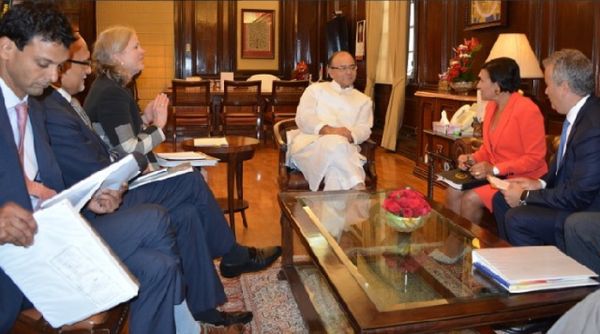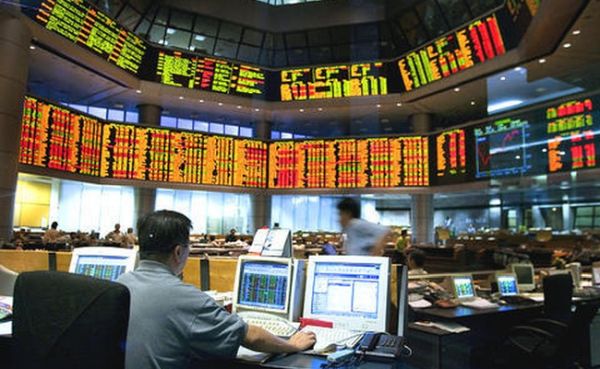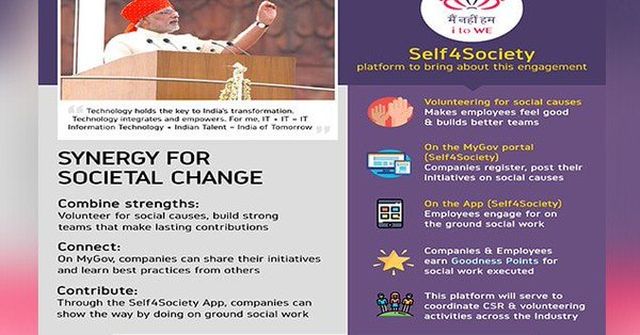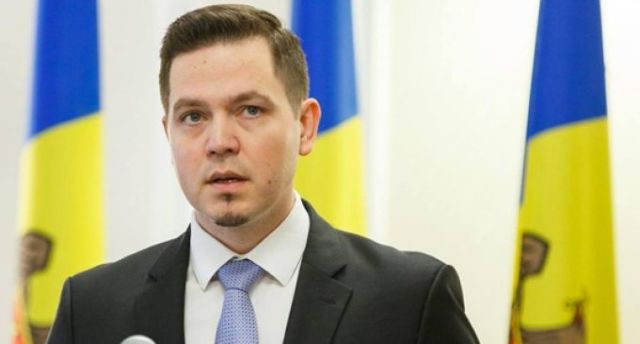
by admin | May 25, 2021 | Opinions
 By D.C. Pathak,
By D.C. Pathak,
We live in the Age of Knowledge that set in with the success of the information technology (IT) revolution at the beginning of the Nineties — 1991 is, in fact, acknowledged as the cut-off year between the new era and the earlier Industrial Age. It gifted a new level of connectivity across geographical frontiers that brought in ‘globalisation’ unleashing a different degree of competitiveness in business and sharing of ideas that would force socio-political transparency. It made the individual the centre of productivity and destroyed many conventional notions of leadership, team work and output. Behind all of this was the new mandate of the Age of Knowledge that being well- informed was the key to success in any field. What then is the meaning of being well-informed?
Being well-informed essentially means having the right information at the right time, having information that makes the difference between a decision and a guess and having information that is actionable. It means two more things. First, being well-informed is not a one-time event since new information was flowing in all the time and one had to remain constantly well informed. Secondly, it means being informed on all aspects of a subject or situation. Knowledge comes in ‘integral packages’ and completeness of information makes for better progress. As an illustration, a school teacher today must know, beyond the syllabus, something about child psychology and parental stress so that parent-teacher interactions can be productive. An employer will do well to understand — beyond the book of profits — that the law of providing a safe workplace to women has to be complied with.
In this age all functions are information driven. Today leadership cannot be claimed on the basis of inheritance or charisma for a leader has to take knowledge-based decisions for success. A leader, therefore, can be said to be made, not born, which is a welcome recognition of merit and performance for achieving a top position. Of course, leadership rests on some other basic prerequisites as well but being well-informed comes first. Corporates today make significant investments on internal information & analysis units to keep abreast of market trends, global competition and even politico-legal environs. The importance of garnering ‘tacit’ knowledge of all members has increased manifold because an employee is now a ‘knowledge worker’ who can reveal ways of enhancing productivity. In a flat organisation, the boss-subordinate relationship calls for the senior having a comprehensive knowledge of the people around including the situation of a subordinate outside of the workplace. Today’s organisational leadership has to keep up with new frontiers of knowledge on work-life balance, gender equality, credit sharing ,transparency and inter-personal relationships that were helped by the leader’s Emotional Intelligence as well.
We live in an unsafe world and individuals, heads of enterprises and those in the government have to have knowledge of the basic framework of what security is and what are the components of a reasonable system that had to be in place to safeguard it. Security begins with the knowledge of threats that existed in a given context or place. Citizens for their own safety must be well-informed on the crime trends endemic to their city. Management of schools for children has to be exposed to the necessary level of Security education to enable them to maintain their reputation and accountability. Recently, a case of murder of a child inside the premises of a well-known school revealed how the school did not even have a secure perimeter which is the first basic requirement of the security system at any place. Interestingly, since even a ‘family’ is like an organisational unit, its head has to keep himself broadly well informed about what is happening with its members and whether there is anything brewing within that needed resolution.
Age of Knowledge has impacted human resource development the most. Organisations now prefer information savvy people to come on board. Such individuals have certain traits. They do not shun reading and tend to categorise information subject or theme wise, have insatiable curiosity that stems from a spirit of inquiry, prefer authentic opinion to gossip which means they are not credulous, have a logical approach in terms of trying to know the What, Why and Where of any situation and finally have interest in human nature and behaviour — for all business is human activity. Recruiters have to look for things beyond CVs and educational degrees. The individual is the focal point of how the organisation will perform and that is why there has to be renewed emphasis on skilling, re-skilling and multi- tasking and regular reminding of the organisation’s mission and methodology.
Decisions now often require information that may not be openly available but need to be accessed through a special effort. Competing enterprises bank on information of intelligence value which means reliable and exclusive information that could throw light on the risks and opportunities that lie ahead. This is why intelligence and confidentiality with which it has to be handled before being put to use, go together. The Age of Knowledge requires well-informed people to appreciate this distinction between information and intelligence. There are many areas of applied intelligence such as ‘due diligence’ for M&As, study of a competitor, scan of external environs, interviews and antecedent verification. In fact, the Age of Knowledge is transiting to the Age of Intelligence at a perceptible pace. Organisations, therefore, need to become Intelligence-oriented.
Information-based actions now run through the successful functioning of individuals and organisations. Creating an organisational environment that adds to the output is a part of the new ethos of the Age of Knowledge. The conceptual framework includes the idea of ‘leveraging individual strengths’ to enhance group productivity, looking upon a multi-cultural team as ‘a powerhouse of creativity’, instilling corporate loyalty through transparency of credit sharing, removal of fear of failure and promotion of work life balance by accepting flexi timings where necessary, building ‘power of relationship’ by encouraging the attitude of giving and taking legitimate help, and using time as a ‘resource’ at par with money and manpower. The whole narrative built around ‘being smart’ is rooted in its definition — producing more per unit of resource whether of funds, manpower or time. Understandably, in the Age of Knowledge, IT is the biggest instrument for making processes and management ‘smart’. Technology, however, cannot do without knowledge-based human intervention and this further proves the importance of being well-informed.
(The writer is a former Director Intelligence Bureau)
—IANS

by admin | May 25, 2021 | Corporate, Corporate finance, Corporate Governance, Corporate Jobs, Employment, Private Jobs
 New Delhi : With middle-class apathy on the rise, Finance Minister Arun Jaitley may double the income tax exemption threshold for the salaried from the present Rs 2.5 lakhs to Rs 5 lakhs while also reinstating tax-free status for medical expenses and transport allowance, providing some relief to the section already under strain since demonetisation.
New Delhi : With middle-class apathy on the rise, Finance Minister Arun Jaitley may double the income tax exemption threshold for the salaried from the present Rs 2.5 lakhs to Rs 5 lakhs while also reinstating tax-free status for medical expenses and transport allowance, providing some relief to the section already under strain since demonetisation.
Though propriety demands that not too many policy changes should be made in a vote on account budget, the BJP government is apprehensive of the possibility of a middle-class backlash in the impending general elections.
Hence the plan to streamline tax slabs, which in any case are in consonance with the coming Direct Tax Code, government sources told IANS.
The problem that may manifest itself is that the Union Budget will precede the unveiling of the Direct Tax Code Report on February 28. Tinkering with the tax rates before the release of the report will make it contentious.
The new Direct Tax Code will try to bring more assessees into the tax net, make the system more equitable for different classes of taxpayers, make businesses more competitive by lowering the corporate tax rate and phase out the remaining tax exemptions that lead to litigation. It will also redefine key concepts such as income and scope of taxation
At the moment, income up to Rs 2.5 lakh is exempt from personal income tax. Income between Rs 2.5-5 lakh attracts 5 per cent tax (see table), while that between Rs 5-10 lakh is levied with 20 per cent tax. Income above Rs 10 lakh is taxed at 30 per cent. Rs 5 lakh exemption is only applicable to individuals of over 80 years.
Also, tax free medical expenses up to Rs 15,000 and transport allowance up to Rs 19,200 per annum has been replaced with a Rs 20,000 standard deduction for those earning above Rs 5 lakh last year. This will benefit tax payers to the tune of Rs 12,500 annually which is not much but can be viewed as a sentiment buster.
A fatigued BJP dispensation realises that as the incumbent it will have to fight off varied challenges.
With acute farm distress, middle class backlash, massive spike in unemployment data and rising Dalit anger taking its toll on the BJP, it would like to unleash a slew of course correctives. The 10 percent quota for upper castes was part of this process to appease vote banks. But this was an executive decision adopted by parliament, tinkering with the tax structure similarly is a legislative decision.
Income Tax Slabs for Individual Tax Payers & HUF (Less Than 60 Years Old) for FY 2018-19 –
Income Tax Slabs Tax Rate
Income up to Rs 2,50,000* No tax
Income from Rs 2,50,000 – Rs 5,00,000 5%
Income from Rs 5,00,000 – 10,00,000 20%
Income more than Rs 10,00,000 30%
—IANS

by admin | May 25, 2021 | Economy, Markets, News
 Mumbai : India’s benchmark indices fell for a second straight day on Wednesday, tailing global peers and led by a slump in software exporters.
Mumbai : India’s benchmark indices fell for a second straight day on Wednesday, tailing global peers and led by a slump in software exporters.
However, a fall in international crude oil price arrested what could have been a sharper decline.
Heavy selling pressure was witnessed in the IT counters, which fell over 3 per cent, followed by Teck (technology, entertainment and media) and energy stocks.
Consequently, the S&P BSE Sensex settled down 274.71 points or 0.77 per cent at 35,119.80, from its previous close of 35,474.51 points.
Similarly, the NSE Nifty50 lost 56.15 points or 0.53 per cent to finish at 10,600.05 points.
The overall market breadth was flat and the broader market indices like Mid and Small-cap segments of the NSE closed higher by 0.50 per cent and 0.48 per cent respectively.
Market observers attributed Wednesday’s fall to a sell-off in global stocks, which was triggered by growing concerns about slowing global growth.
“Domestic stocks began the day on a negative note on subdued Asian indices. A sudden sell-off in index pivotals dragged the indices to intra-day lows in morning trade,” said Abhijeet Dey, Senior Fund Manager-Equities, BNP Paribas Mutual Fund.
“Despite a subsequent mild recovery, the benchmark indices continued to trade under pressure and finally closed the day with losses of over 0.50%.”
Vinod Nair, Head of Research, Geojit Financial Services, said: “Market traded on a weak note despite a positive opening in European market and further slide in oil prices.”
“A rebound in PSU banks due to extension of the timeline for the full implementation of Basel 3 norms, and gains in pharma stocks helped the market trim some losses in early hours of trade. However, continued selling in IT stocks on account of a strong rupee restricted the recovery.”
The Brent crude oil price fell below $64-per-barrel mark.
“Crude oil prices are falling as US inventories rose last week. US inventories are at their highest level since 2015. Crude oil remains under pressure amid expectations of slowing global demand,” Anuj Gupta, Deputy Vice President, Research, Commodities and Forex, Angel Broking, told IANS.
The short-term trend of the Nifty has turned weak.
“The Nifty is currently placed at the key lower support of 10,620-10,558 levels, as per the concept of change in polarity,” said Deepak Jasani, Retail Research Head, HDFC Securities.
“As long as this support holds, there is a possibility of a bounceback. Support on breach of these levels could come in at 10,452.”
In terms of investments, provisional data with the exchanges showed that foreign institutional investors sold stocks worth Rs 1,652.04 crore on Wednesday while the domestic institutional investors bought scrips worth Rs 606.73crore.
Top gainers on the Sensex were Yes Bank, up 2.83 per cent at Rs 198; Axis Bank, up 2.20 per cent at Rs 626.35; Adani Ports, up 1.91 per cent at Rs 360.90; Asian Paints, up 1.25 per cent at Rs 1,322.90 and State Bank of India (SBI), up 1.24 per cent at Rs 286.55.
The laggards were Tata Consultancy Services (TCS), down 3.51 per cent at Rs 1,811.75; Infosys, down 3.14 per cent at Rs 620.95; Power Grid, down 2.74 per cent at Rs 182.85; Wipro, down 2.38 per cent at Rs 314.05, and Reliance Industries, down 2.31 per cent at Rs 1,112.30 per share.
—IANS

by admin | May 25, 2021 | Branding, Corporate, Corporate Governance, Markets, Networking, News, Online Marketing, Politics, Social Media, Technology
 New Delhi : Prime Minister Narendra Modi will launch a Corporate Social Responsibility (CSR) platform and address a townhall of IT and electronic manufacturing professionals on October 24.
New Delhi : Prime Minister Narendra Modi will launch a Corporate Social Responsibility (CSR) platform and address a townhall of IT and electronic manufacturing professionals on October 24.
Modi tweeted this on Friday addressing all Indian technocrats who would be joining him for the townhall for a discussion on the ways through which a vibrant IT and electronic manufacturing sector could undertake initiatives and volunteer to contribute building a New India.
The Ministry of Electronics and IT stated the CSR platform would help IT and electronic professionals to share their stories.
—IANS

by admin | May 25, 2021 | Commodities, Commodities News, Commodity Market, Interviews, Investing

Tudor Ullanovschi
By Aroonim Bhuyan,
New Delhi : The East European nation of Moldova is wooing Indian investors in the areas of textiles, agriculture, pharmaceuticals and IT among others as it is set to open an embassy in this country in 2019, 28 years after attaining independence following the dissolution of the USSR.
“This year I took the decision of opening three new embassies from the beginning of next year – in Argentina, in Ghana and, of course, number one in India,” Moldovan Minister of Foreign Affairs and European Integration Tudor Ullanovschi told IANS in an exclusive interview here.
Ullanovschi, who assumed office in January this year, is the first Moldovan Foreign Minister to visit India after the country came into being in 1991.
“We have a strong interest in increasing our trade balance,” he said. “At this point we have 30-plus million euros (around $34 million/over Rs 2 billion) of bilateral trade.”
Stating that Moldova imports much more from India than it exports, he said both countries have agreed to synchronise the certification of food and agricultural products.
“Moldova has organic fruits and vegetables. We have very good quality apples, plums, walnuts, and other types of fruits as also sunflower oil, grains, cereals,” he said.
“So the export of Moldovan agricultural products is a priority that we have.”
Ullanovschi also said that Indian producers can use the “extremely high quality” agricultural land in his country.
He said that Moldova invites Indian companies to explore its market because of the advantageous position it is in.
Moldova has free trade agreements with the European Union, the Commonwealth of Independent States (CIS), and Turkey.
“Now we are discussing a free trade agreement with EFTA (European Free Trade Association) countries – Switzerland, Liechtenstein, Norway and Iceland,” the Foreign Minister said.
“The Moldovan government provides extraordinary fiscal incentives for investments. If a company invests more than $1 million in a free economic zone in Moldova, it does not have to pay taxes for three years.”
Ullanovschi said that he would like to send a message Indian companies, be it in textiles or pharmaceuticals, involved in production activities to come to Moldova.
“In September, we are going to send a delegation of 10-12 textile business people of Moldova to India to see what are the benefits of cooperation to either buy yarn or fabric from India,” he said.
He also said that of the around 300 Indians living in Moldova, over 280 are students of the Moldova State University of Medicine and Pharmacy in the country’s capital Chisinau.
He said that another area of interest for both Moldova and India is the IT and ICT sector.
“Moldova is among the top 10 countries with the fastest internet speed in the world,” Ullanovschi said.
Stating that his country has a unique tax system for the IT sector, he said: “If a foreign company invests in the IT sector in Moldova, there is only one tax of 7 per cent. You invest and you will have a successful business in the IT sector.”
Ullanovschi said that both Moldova and India have nearly finalised a memorandum of understanding on setting up ICT knowledge centres in both countries.
He also said that his country is interested in an economic and trade agreement as also a foreign investment promotion and protection agreement with India.
He stressed on a visa agreement between Moldova and India as Indians need an invitation from Moldova to visit that country now.
“We have to remove the barriers between our countries, so people can travel freely for tourism to flourish,” Ullanovschi said.
In this connection, he said that his country is also interested in signing an air services agreement with India.
“The Republic of Moldova is a member of the European Common Aviation Area and there is no limit in the number of flights from Moldova to the EU,” he said.
“One idea could be to sign an inter-airline or code-share agreement between the Moldovan airlines and Indian air operators.”
Stating that there was 35 per cent increase in the number of Indian tourists to Spain after Indian films were shot in that country, the Moldovan Minister invited Bollywood to explore his country.
With Moldova being one of the top wine exporters in the world, another point of interest for Indian tourists, Ullaovschi said, will be the 200-km-long underground wine cellar in his country, which figures in Guinness World Records for being the world’s largest.
For Moldovans, an area of interest in India is medical tourism.
“We are thinking of vacation packages that will include consulting doctors in India and then going on vacation to places like Goa,” Ullanovschi said.
(Aroonim Bhuyan can be contacted at aroonim.b@ians.in)
—IANS





